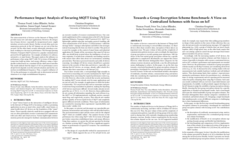New accepted papers at the ACM/SPEC International Conference on Performance Engineering (ICPE) [27.01.21]
Christian Krupitzer from the Department of Food Informatics is co-author of the peer-reviewed conference papers "Performance Impact Analysis of Securing MQTT Using TLS" and “Towards a Group Encryption Scheme Benchmark: A View on Centralized Schemes with focus on IoT” at the ACM/SPEC International Conference on Performance Engineering (ICPE).The publication "Performance Impact Analysis of Securing MQTT Using TLS" by Thomas Prantl (University of Würzburg) with co-authors Lukas Iffländer, Stefan Herrnleben, Simon Engel, Samuel Kounev (all University of Würzburg) and Christian Krupitzer (Department of Food Informatics, University of Hohenheim) was accepted at the ACM/SPEC International Conference on Performance Engineering (peer-reviewed). The International Conference on Performance Engineering, sponsored by ACM and SPEC, provides a forum to integrate theory and practice in the field of performance engineering by providing a forum for sharing ideas and experiences between industry and academia.
The interconnectivity of devices on the Internet of Things (IoT) provides many new and smart applications. However, the integration of many devices - especially by inexperienced users - might introduce several security threats. Further, several often used communication protocols in the IoT domain are not out-of-the-boxsecured. On the other hand, security inherently introduces overhead, resulting in a decrease in performance. The Message QueuingTelemetry Transport (MQTT) protocol is a popular communication protocol for IoT applications - for example, in Industry 4.0, railways, automotive, or smart homes. This paper analyzes the influence on performance when using MQTT with TLS in terms of throughput, connection build-up times, and energy efficiency using a reproducible testbed based on a standard off-the-shelf microcontroller. The results indicate that the impact of TLS on performance across all QoS levels depends on (i) the network situation and (ii) the connection reestablishment frequency. Thus, a negative influence of TLS on the performance is noticeable only in deteriorated networksituations or at a high connection reestablishment frequency.
Further, the publication "Towards a Group Encryption Scheme Benchmark: A View on Centralized Schemes with focus on IoT" by Thomas Prantl (University of Würzburg) with co-authors Peter Ten, Lukas Iffländer, Stefan Herrnleben, Alexandra Dmitrenko, Samuel Kounev (all University of Würzburg) and Christian Krupitzer (Department of Food Informatics, University of Hohenheim) was accepted at the ACM/SPEC International Conference on Performance Engineering (peer-reviewed).
The number of devices connected to the Internet of Things (IoT) is continuously increasing to several billion nowadays. As those devices often share sensitive data, encryption of those data is an important issue. The pure volume of data and the complexity of communication patterns increases, and, accordingly, the importanceof group encryption is recently gaining more importance. Still, the choice of the best-suited group encryption scheme for a specific application is complicated. Benchmarks can support this choice. However, while literature distinguishes three categories for theschemes (central, decentral, and hybrid), a one-fits-all benchmark seems challenging to achieve. In this paper, we go the first step towards a structured benchmark for group encryption schemes by presenting a benchmark for centralized group encryption schemes in an IoT scenario. To this end, our benchmark includes a descriptionof workloads, a baseline scheme, a measurement setup, and metrics while also considering the requirements and features of centralized group encryption schemes.
The publications are available in the ACM Digital Library ("Performance Impact Analysis of Securing MQTT Using TLS" and “Towards a Group Encryption Scheme Benchmark: A View on Centralized Schemes with focus on IoT”).


